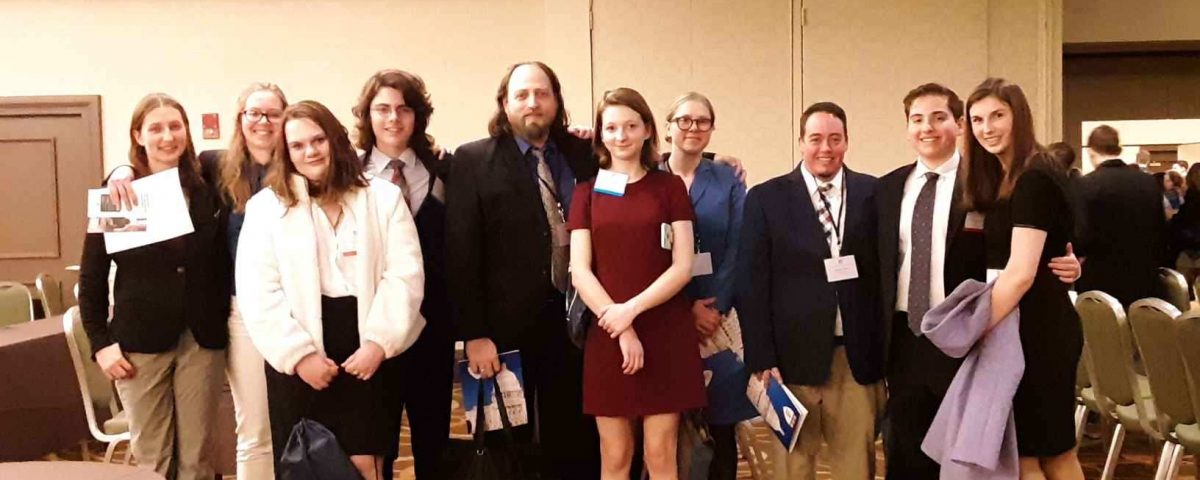Oli Students Take Harvard Model Congress by Storm
Oli Students Take Harvard Model Congress by Storm








At the 2019 Harvard Model Congress, Oliverian students mastered the ins and outs of the American judiciary and legislative processes, debating real-world issues and practicing policymaking.
Each year, high school students from across the country come together to participate in the Harvard Model Congress (HMC), an immersive 3-day conference, which uses simulation to expose participants to the central functions of the American government. Since 1986, HMC has challenged high schoolers to develop their teamwork, leadership, and creative problem-solving skills in order to debate across party lines and draft bipartisan legislation.
This year, seven Oliverian students attended the 34th Boston HMC, held at the city’s Sheraton Hotel from February 21 to 24. After overcoming their initial nerves and apprehensions, Oli students rose to the challenge to “pass” powerful legislation, engage in bipartisan dialogue and debate, receive awards, and make new friends along the way.
Celebrating Oliverian Students’ HMC Wins
At this year’s Harvard Model Congress, five Olis served as House representatives or senators, while two Olis were placed on the Supreme Court team. Through a series of preliminary meetings, faculty advisor Micah Weiss trained Oliverian HMC attendees on what to expect, how to prepare, and tips to help them succeed in their respective roles. “I think our delegation was the best I’ve seen in the five years I’ve been coaching,” says Weiss.
Serena, who was appointed to serve on a house judiciary committee, felt anxious during her first committee meeting. However, she was able to quickly transform her worries into confidence, passing a bill in her next committee meeting. During the conference, Serena engaged in debates surrounding contemporary political issues, including the closure of Guantanamo Bay.
Charles was assigned to play Maine independent senator Angus King. The chair of his committee, a Harvard undergraduate student, went out of his way to express how well-prepared Charles was after watching him advocate for the interests of Maine lobstermen during the debate surrounding an energy resource distribution bill.
Riley’s designated role involved playing a Republican senator. “I don’t think Riley is in personal alignment with all of the political beliefs of the senator she played,” says Weiss, “which made it all the more impressive that she was able to confront these psychological challenges in order to shine on the Senate floor — she got fired up and did a great job delivering her senator’s viewpoint.”
Before heading to Boston, Elizabeth was so nervous that she was hesitant to go at all. Weiss encouraged her to still attend the event. “I told her, ‘This is a low-stress situation; you don’t have to say anything if you don’t want, as long as you come,’” Weiss recalls. “We were all blown away when she marched into her first committee meeting and owned the whole thing.” Elizabeth penned several original bills, successfully drafted and passed amendments and defended her own bills in front of the entire House — a 150+ member audience. She received an honorable mention award for her committee.
Liam played a conservative House representative from Florida, embracing the role wholeheartedly as an opportunity to learn about policymaking and hone his public speaking skills. Leveraging his interest in game theory, he communicated with committee members one-on-one to advance his agendas. In another instance, Liam delivered a fiery speech in opposition to a bill that captured the full attention of HMC attendees. As Weiss puts it, “He is incredibly well-spoken, astute, and convincing — to a nearly professional level.” Liam successfully passed two bills within his committee — including one to defund the Mueller investigation that received bipartisan support — as well as one within the whole House, earning him the Best Delegate award!
Finally, Shelby and Angela were placed on a Supreme Court team. In the Supreme Court hearings at the Harvard Model Congress, teams of two rotate through various cases as the justices hearing the case, the petitioners, and the respondents, assigned at random. As such, the role required thorough advanced preparation — Shelby and Angela had to study three court briefings and be prepared to argue either side. They won all three of their cases, including one for which they received no preliminary information.
The Power of Experiential Learning
According to Weiss, the experiential and immersive nature of HMC proves a highly effective mode of learning for many Oli students. “I can teach government in my American studies classes and students will absorb some of the knowledge — but nothing compares to the lived experience of collaborating to shape policy, advocating for your viewpoint, and participating in the structured processes that drive change in this country,” he explains.
Further, Weiss stresses the important takeaways that often come with the increased agency students experience at Harvard Model Congress. “When our students attend HMC, they wear business attire and they receive a stipend so they can eat meals on their own in the city,” he said. “For many Oli students, this sense of independence and responsibility serve as testament to how mature and capable they are of taking care of themselves and overcoming their own mental hurdles in order to engage in meaningful dialogue and push themselves to become more critical thinkers.”
